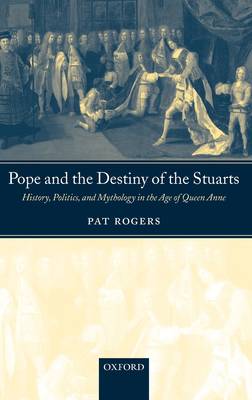
- Retrait gratuit dans votre magasin Club
- 7.000.000 titres dans notre catalogue
- Payer en toute sécurité
- Toujours un magasin près de chez vous
- Retrait gratuit dans votre magasin Club
- 7.000.0000 titres dans notre catalogue
- Payer en toute sécurité
- Toujours un magasin près de chez vous
Pope and the Destiny of the Stuarts
History, Politics, and Mythology in the Age of Queen Anne
Pat Rogers
Livre relié | Anglais
330,45 €
+ 660 points
Description
This radical new look at the literary and political climate of England during the reign of Queen Anne examines the work of the greatest poet of the age, Alexander Pope. Pope and the Destiny of the Stuarts provides the fullest contextual account to date of Windsor-Forest (1713), widely seen as a key text in the evolution of early eighteenth-century poetry. It examines the poem's topical and political aspects and offers a reconfiguration of Pope's early career, demonstrating that this was a pivotal period, marking a critical watershed in both his personal and literary development. The book gives a complete account of Pope's life and work in his early twenties, and supplies a new political interpretation, including a careful analysis of possible Jacobite colorings. Attention is directed towards a range of literary, historical, ideological, and artistic issues. The book draws on classical studies (the role of Virgil and Ovid especially), Renaissance scholarship, literary history, political history, and artistic contexts. The key ideas and techniques of Windsor-Forest are related to Pope's other early works, including the Pastorals and, centrally, The Rape of the Lock. Rogers goes on to reassess the poet's dealings with the Scriblerus group. He shows previously unnoted textual connections with the work of Swift, Gay, Parnell, and also Prior, and casts fresh light on the tortuous process of composition and revision of Windsor-Forest, with a description of the manuscript and an account of the publishing and textual history, while numerous allusions are traced for the first time. Pope and the Destiny of the Stuarts will be of interest to scholars and students of eighteenth-century literature, history, and politics.
Spécifications
Parties prenantes
- Auteur(s) :
- Editeur:
Contenu
- Nombre de pages :
- 360
- Langue:
- Anglais
Caractéristiques
- EAN:
- 9780199274390
- Date de parution :
- 15-09-05
- Format:
- Livre relié
- Format numérique:
- Genaaid
- Dimensions :
- 156 mm x 234 mm
- Poids :
- 684 g

Les avis
Nous publions uniquement les avis qui respectent les conditions requises. Consultez nos conditions pour les avis.






